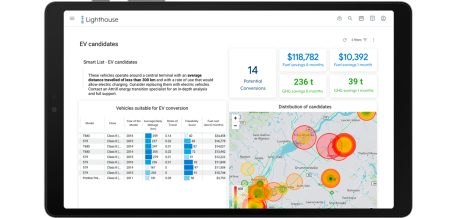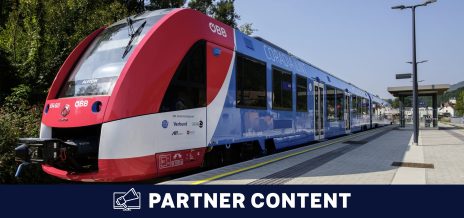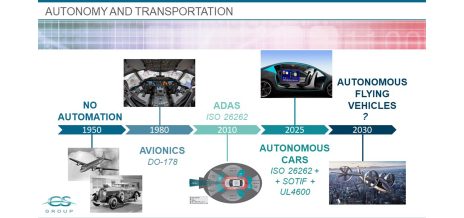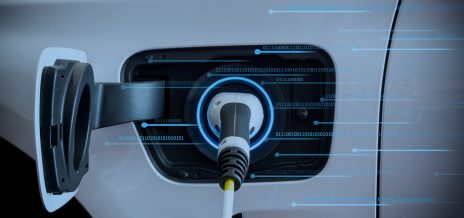Propulsion Québec and Mila join forces to move innovative mobility forward

Propulsion Québec and Mila, two organisations committed to Quebec’s social and economic development, have joined forces to accelerate the creation and implementation of innovative mobility projects. This new partnership was announced during the Movin’On sustainability summit.
This partnership is the first of its kind to be developed with an industrial cluster, and it is a concrete step towards consolidating the artificial intelligence (AI) industry and the smart and electric transportation ecosystem.
“This was an entirely natural pairing given the current context, where mobility is constantly changing. A lot of people think the future of mobility lies in connected, autonomous, shared and electric vehicles. This means that our two specialized fields overlap in important ways, and that we can inspire, influence and complement each other’s respective missions,” explains Sarah Houde, CEO of Propulsion Québec.
As a part of its mission, Mila aims to contribute to social dialogue and develop applications that benefit society. More than ever before, the mobility sector is a part of that discussion, as it requires innovative technology to meet its environmental, economic and social goals. Propulsion Québec’s wide range of partners in the mobility sector open up tremendous opportunities for building connections between the AI research sector and the smart and electric transportation industry.
Both organisations are excited to work together, complementing each other’s strengths to dream up and develop solutions that meet society’s current and future mobility needs. Mila and Propulsion Québec’s teams have already begun laying the groundwork for their future collaborative projects.
Cover image by Raphaël Thibodeau. Left to right: Félix Bernard, Lawyer, Langlois Avocats; Valérie Pisano, President and CEO, Mila; Sarah Houde, CEO, Propulsion Québec; Louis Tremblay, Chairman of the Board of Directors, Propulsion Québec.
Continue reading on this subject

Will industrial strategies chart a new course for the future of Quebec industries?
The Quebec economy—and more broadly the world economy—faces multiple challenges: the climate crisis, supply chain problems, labour shortages, inflation, etc. Quebec has an abundant supply of resources, know-how, and expertise; however, the next points on its agenda should include structuring, developing, and planning industrial activities.
Read more
Telematic Data: the Key to a Successful Energy Transition
Fleet managers are currently facing the colossal challenge of the energy transition, in order to meet legislative requirements and societal demands. For most carriers, both in the passenger transport sector and in the last mile delivery sector, this green shift has already begun.
Read more
Ambition EST 2030 : a roadmap for propelling Quebec to the forefront of the electric and smart transportation industry by 2030
Propulsion Québec, the cluster for electric and smart transportation, is announcing Ambition EST 2030, a roadmap for the electric and smart transportation (EST) industry developed in partnership with Deloitte.
Read more
Energy transition, the challenge that is shaking up the trucking industry
The U.S. Department of Energy recently released a report containing a vehicle cost analysis for zero-emission medium and heavy-duty trucks.
Read more
The Mobility of the Future is Smart, Green, Inclusive and Healthy
Innovation is part of our Alstom in Motion 2025 strategy. It has brought us to where we are today, and we want to go even further. With the new scale and combined expertise, Alstom has doubled its innovation capacity and we will support this growth by doubling the financial investments in R&D, up to 600 million euros (875 million Canadian dollars) per year by 2024.
Read more
Astus – Proud to support IMPULSION MTL 2021
With more than 25 years of expertise in the field of vehicle telematics, Astus is now a key player in the energy and digital transition of mobility and transport.
Read more
LiDAR and AI in autonomous vehicle commercialization and functional safety
The story of smart, autonomous transportation began nearly half a century ago. In the early 1980s, avionics systems started to replace more traditional mechanical and hydraulic systems through calculators and embedded software.
Read more
Is there a regulatory framework for location data?
Analysing location data can help service providers assess whether to boost services in one part of a city versus another, at a particular time of day or in preparation for an upcoming festival, for instance. However, the data used for these analyses is linked to individuals and makes it possible to identify them.
Read more
How to develop a successful strategy for your transition towards EVs
To this day, it is not uncommon to see a good number of companies relying on assumptions, sometimes non-global and inaccurate information reports in order to manage their vehicle fleet.
Read more
Five key Cybersecurity takeaways for the automotive industry
In our ever-changing connected world, digital transformation is affecting every aspect of our lives. The automotive industry is no exception to this evolution: our cars are becoming our best co-pilots, allowing us to plan our trips with real-time data or read and respond to text messages using voice command.
Read more






